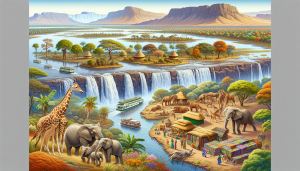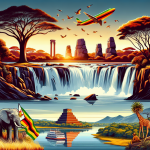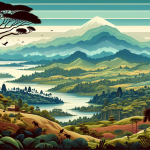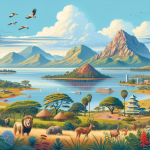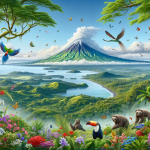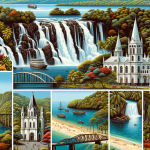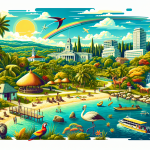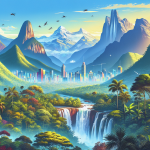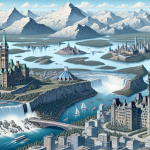Exploring Zambia: A Land of Untamed Beauty and Adventure
Known for its vast wilderness, stunning landscapes, and rich cultural heritage, Zambia is a country that promises an unforgettable adventure for any traveler. Located in the heart of Southern Africa, Zambia offers a unique blend of natural beauty and vibrant culture. Whether you’re an adrenaline junkie looking for your next thrill, a nature enthusiast eager to explore diverse ecosystems, or a cultural traveler interested in history and traditions, Zambia has something to offer. **From the thunderous Victoria Falls to the serene Zambezi River, and the sprawling national parks teeming with wildlife**, Zambia is a treasure trove of experiences waiting to be discovered. This guide will delve into the various facets that make Zambia a must-visit destination, offering insights and tips to help you plan the perfect trip. So, gear up and get ready to explore the magic of Zambia.
The Majestic Victoria Falls
One of the most iconic landmarks in Zambia is the majestic Victoria Falls, also known as “Mosi-oa-Tunya,” meaning “The Smoke That Thunders.” This natural wonder is one of the largest and most famous waterfalls in the world, and it straddles the border between Zambia and Zimbabwe. Standing at over 355 feet tall and stretching over a mile wide, Victoria Falls is a sight to behold. The sheer power and beauty of the falls have earned it a spot on the UNESCO World Heritage List. If you’re visiting Zambia, experiencing the awe-inspiring Victoria Falls is a must. The best time to visit is during the rainy season from February to May, when the Zambezi River is at its fullest, creating a breathtaking cascade of water.
Activities at Victoria Falls
Victoria Falls offers a plethora of activities for adventure seekers and nature lovers alike. **For thrill-seekers, bungee jumping off the Victoria Falls Bridge** is a once-in-a-lifetime experience. The bridge spans the Zambezi River and offers a stunning view of the falls. If you prefer a more relaxed adventure, try a scenic helicopter flight over the falls for a bird’s-eye view of this natural wonder. For those who love to get up close and personal with nature, consider taking a walking tour along the various viewpoints on the Zambian side of the falls. The Knife-Edge Bridge offers particularly spectacular views, allowing you to feel the mist and hear the thunderous roar of the falls.
Exploring Zambia’s National Parks
Zambia is home to some of Africa’s most pristine national parks, offering unparalleled wildlife experiences. **South Luangwa National Park** is often considered one of the best places in the world for walking safaris. This park is teeming with wildlife, including elephants, lions, leopards, and a variety of antelope species. The Luangwa River, which runs through the park, attracts a plethora of animals, making it an excellent spot for game viewing. Another notable national park is **Kafue National Park**, the oldest and largest in Zambia. Covering an area of over 22,000 square kilometers, Kafue is known for its diverse ecosystems, ranging from wetlands to savannas. The park is home to an array of wildlife, including the elusive cheetah and the rare African wild dog.
Wildlife Viewing and Safari Experiences
When it comes to wildlife viewing, Zambia offers some of the most authentic and uncrowded experiences in Africa. **Walking safaris in South Luangwa National Park** are a unique way to explore the bush and get close to nature. Guided by experienced rangers, you can walk through the park, learning about the flora and fauna and spotting animals in their natural habitat. Night drives are another popular activity, offering the chance to see nocturnal animals like leopards and hyenas. In Kafue National Park, boat safaris on the Kafue River provide a different perspective, allowing you to see animals like hippos and crocodiles up close. Whether you choose a traditional game drive, a walking safari, or a boat safari, Zambia’s national parks offer unforgettable wildlife experiences.
The Zambezi River: A Lifeline of Adventure
The Zambezi River is one of Africa’s longest and most significant rivers, flowing through six countries before emptying into the Indian Ocean. In Zambia, the Zambezi River offers a wealth of activities for adventure enthusiasts. One of the most popular activities is white-water rafting in the Batoka Gorge, located downstream from Victoria Falls. The rapids in this section of the river are some of the most challenging and exhilarating in the world, making it a favorite among adrenaline junkies. For those who prefer a more relaxed adventure, canoeing safaris on the Lower Zambezi River provide a peaceful way to explore the river’s wildlife and scenery. As you paddle through the calm waters, you can spot elephants, hippos, and a variety of bird species along the riverbanks.
Fishing and Sunset Cruises
The Zambezi River is also a paradise for fishing enthusiasts. **Tiger fishing** is particularly popular, with the river being home to the fierce and powerful tiger fish. These fish are known for their strength and agility, making them a challenging catch for even the most experienced anglers. Fishing trips on the Zambezi River can be arranged through various lodges and tour operators, providing everything you need for a successful fishing adventure. For a more leisurely experience, consider taking a sunset cruise on the Zambezi River. These cruises offer a relaxing way to enjoy the river’s beauty, with stunning views of the sunset and opportunities to spot wildlife along the riverbanks. As the sun sets over the Zambezi, the sky transforms into a canvas of vibrant colors, creating a magical end to your day.
Cultural Experiences and Local Traditions
While Zambia is renowned for its natural beauty and wildlife, its cultural heritage is equally rich and diverse. The country is home to over 70 ethnic groups, each with its own unique traditions and customs. One of the best ways to experience Zambia’s culture is by visiting local villages and participating in cultural tours. These tours offer a glimpse into the daily lives of the local people, allowing you to learn about their traditions, crafts, and way of life. The **Lozi people**, for example, are known for their intricate beadwork and traditional ceremonies. The **Kuomboka ceremony**, held annually in the Western Province, is one of Zambia’s most famous cultural events. This colorful and vibrant ceremony marks the end of the rainy season and the migration of the Lozi king from his floodplain palace to higher ground.
Traditional Music and Dance
Music and dance play a significant role in Zambian culture, with each ethnic group having its own unique styles and rhythms. Traditional music often features a combination of drums, xylophones, and other percussion instruments, creating lively and rhythmic tunes. Dance is an integral part of many cultural ceremonies and celebrations, with each dance telling a story or conveying a message. The **Makishi dancers** of the **Luvale people** are particularly famous for their masked performances, which are part of the initiation ceremonies for young boys. These dances are not only a form of entertainment but also a way to preserve and pass down cultural traditions from one generation to the next. Experiencing traditional music and dance in Zambia is a captivating and immersive way to connect with the local culture.
Planning Your Trip to Zambia
When planning a trip to Zambia, there are several key factors to consider to ensure a smooth and enjoyable experience. **The best time to visit Zambia** is during the dry season, which runs from May to October. During this time, the weather is pleasant, and wildlife viewing is at its best, as animals congregate around water sources. If you’re planning to visit Victoria Falls, the rainy season from February to May is ideal, as the falls are at their most spectacular. However, be prepared for occasional rain showers during this time.
Travel Tips and Practical Information
When traveling to Zambia, it’s important to be aware of practical considerations such as visas, vaccinations, and currency. Most visitors to Zambia require a visa, which can be obtained upon arrival at the airport or through the Zambian embassy in your home country. It’s also essential to have up-to-date vaccinations, including those for yellow fever, typhoid, and hepatitis A and B. Malaria is prevalent in Zambia, so taking antimalarial medication and using mosquito repellent is highly recommended. The local currency is the Zambian kwacha, but US dollars are widely accepted in major tourist areas. It’s a good idea to carry some cash, as credit card facilities may not be available in remote areas.
Accommodation Options in Zambia
Zambia offers a range of accommodation options to suit different budgets and preferences. **Luxury lodges and safari camps** are popular choices for travelers seeking comfort and convenience. These lodges often provide all-inclusive packages, including meals, guided safaris, and other activities. Some of the top luxury lodges in Zambia include **Royal Livingstone Hotel** near Victoria Falls, **Chinzombo Camp** in South Luangwa National Park, and **Ila Safari Lodge** in Kafue National Park. For a more budget-friendly option, consider staying in guesthouses or camping in designated campgrounds. Many national parks have campsites where you can set up your tent and enjoy the great outdoors. Backpacker hostels are also available in major towns and cities, offering affordable accommodation and a chance to meet fellow travelers.
Local Cuisine and Dining Experiences
No trip to Zambia is complete without sampling the local cuisine. Zambian food is hearty and flavorful, often featuring a variety of meats, vegetables, and grains. One of the most popular dishes is **nshima**, a thick porridge made from maize meal, which is typically served with a side of meat, fish, or vegetables. Other traditional dishes include **chicken stew**, **kapenta** (dried fish), and **ifisashi** (a dish made from spinach and groundnuts). For a more unique dining experience, consider visiting a local market or food stall, where you can try street food and interact with the locals. In major towns and cities, you’ll also find a range of international restaurants offering everything from Italian and Chinese to Indian and Middle Eastern cuisine.
Responsible Travel and Conservation Efforts
As a traveler, it’s important to practice responsible travel and support conservation efforts in Zambia. The country’s national parks and wildlife reserves are vital for the protection of its diverse ecosystems and species. Many lodges and tour operators in Zambia are committed to sustainability and conservation, working to minimize their environmental impact and support local communities. When choosing accommodation or booking activities, look for establishments that are eco-friendly and contribute to conservation projects. Additionally, be mindful of your actions while traveling, such as avoiding single-use plastics, respecting wildlife, and supporting local businesses. By traveling responsibly, you can help ensure that Zambia’s natural beauty and cultural heritage are preserved for future generations to enjoy.
Supporting Local Communities
Supporting local communities is another essential aspect of responsible travel in Zambia. Many local communities rely on tourism for their livelihoods, and your visit can have a positive impact. Consider purchasing souvenirs and crafts directly from local artisans, participating in community-based tours, and staying in locally-owned accommodations. Some lodges and tour operators also offer opportunities to visit and support community projects, such as schools, health clinics, and conservation initiatives. By engaging with local communities and supporting their efforts, you can contribute to sustainable development and create meaningful connections during your travels.
Final Thoughts on Visiting Zambia
Zambia is a destination that offers something for every traveler, from the thrill of adventure to the serenity of nature and the richness of culture. **Its diverse landscapes and abundant wildlife** make it a paradise for nature lovers, while its vibrant traditions and friendly people offer a warm welcome to all who visit. Whether you’re exploring the breathtaking Victoria Falls, embarking on a safari in one of the national parks, or immersing yourself in the local culture, Zambia promises an experience that will leave you with lasting memories. As you plan your trip, remember to travel responsibly and support conservation and community efforts, ensuring that the beauty and magic of Zambia can be enjoyed by generations to come. So pack your bags, set off on an adventure, and discover the wonders of Zambia.
For more detailed information on planning your trip to Zambia, visit Zambia Tourism.
